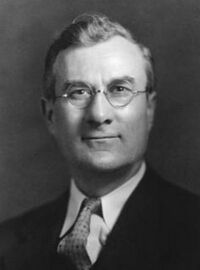User:Milton Beychok/Sandbox: Difference between revisions
imported>Milton Beychok No edit summary |
imported>Milton Beychok No edit summary |
||
| Line 2: | Line 2: | ||
Warren Kendall Lewis (August 1882–March 1975) was a major leader in the development of [[chemical engineering]]. He has often been referred to as the father of modern chemical engineering for his role in coordination of [[chemistry]], [[physics]] and [[engineering]] into an independent discipline serving the chemical industry. | Warren Kendall Lewis (August 1882–March 1975) was a major leader in the development of [[chemical engineering]]. He has often been referred to as the father of modern chemical engineering for his role in coordination of [[chemistry]], [[physics]] and [[engineering]] into an independent discipline serving the chemical industry. | ||
Born on a farm in [[Delaware]], Lewis transferred to [[Newton]], [[Massachusetts]] during his high school days. He subsequently entered the [[Massachusetts Institute of Technology]] (MIT) in 1901 and enrolled | Born on a farm in [[Delaware]], Lewis transferred to [[Newton]], [[Massachusetts]] during his high school days. He subsequently entered the [[Massachusetts Institute of Technology]] (MIT) in 1901 and enrolled as a mechanical engineering student. A year later, he transferred to the chemical engineering option of MIT's chemistry department. He graduated with a degree in chemistry and, following a year as a laboratory assistant, was awarded a fellowship to study [[physical chemistry]]at the [[University of Breslau]]( (Universität Breslau) [[in Germany]]. | ||
Revision as of 00:33, 17 January 2010
Warren Kendall Lewis (August 1882–March 1975) was a major leader in the development of chemical engineering. He has often been referred to as the father of modern chemical engineering for his role in coordination of chemistry, physics and engineering into an independent discipline serving the chemical industry.
Born on a farm in Delaware, Lewis transferred to Newton, Massachusetts during his high school days. He subsequently entered the Massachusetts Institute of Technology (MIT) in 1901 and enrolled as a mechanical engineering student. A year later, he transferred to the chemical engineering option of MIT's chemistry department. He graduated with a degree in chemistry and, following a year as a laboratory assistant, was awarded a fellowship to study physical chemistryat the University of Breslau( (Universität Breslau) in Germany.
